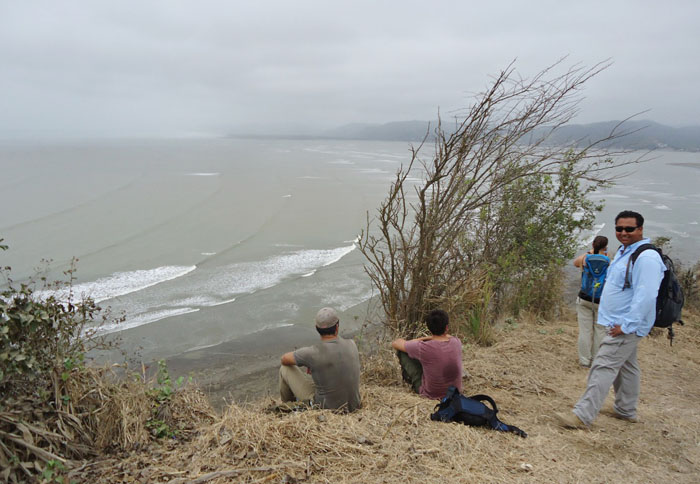“Building Bioregional Communities” in Bahía de Caráquez
In 2012 the first Study-Abroad class arrived for three weeks in September from the University of Oregon with their teacher, Gerardo Sandoval.
Planet Drum’s (PD) field projects in Ecuador came to an apex this past summer when a group of fourteen University of Oregon (UO) students traveled to Bahía de Caráquez on a three week, study-abroad program titled “Building Bioregional Communities.” The program combined multiple aspects of PD’s ecological restoration work from revegetation, sustainable land use, and bioregional education, to community outreach and ancient-culture practices. It marked the first time that students received university course credit for participating with Planet Drum.
The students learned about the theory and practice of bioregional concepts by studying texts on the subject as well as getting dirty out in the field. Class time was divided between discussions based upon the assigned readings, hands-on work and fieldtrips.
Students read Open Veins of Latin America (E. Galeano), Dwellers in the Land (K. Sale), and Envisioning Sustainability (P. Berg) among other texts, and their discussion topics included “Colonization and the Growth Paradigm,” “From Risk Society to Bioregional Futures,” and “Is Bahía de Caráquez an Eco-City?”
They learned about PD’s Dry Tropical Forest Revegetation Project by getting sweaty at the greenhouse and at several of the revegetation sites. In-depth instruction was given in composting, soil preparation, seedling transplanting, and site maintenance such as machete work and watering.
Community reconnaissance and getting familiar with the Bahía bioregion was a major aspect of the course as well. A variety of excursions took the class to local points of bioregional interest, such
as ecological city waste processing facilities, organic farms, wild parks, nature reserves and archeological sites.

Photo: Gerardo Sandoval
Some of the highlights of the program included machete use lessons from Orlando Arias, the PD field foreman; an overnight stay on the beach at former Bioregional Education teacher Ramon
Cedeño’s family land, where Ramon is transforming the property into a nature reserve; and seeing first-hand how local communities are struggling to develop themselves and remain ecological at the same time.
One of the more inspirational moments of the trip was during the class on “Green Cities” when students discussed Peter Berg’s book Envisioning Sustainability while analyzing Bahía’s Eco-city movement and what bioregional living entails. Berg’s ideas on bioregional worth, solidarity with the Earth, and humans’ relation to wild, natural cycles took on a heightened sense of urgency for the group in the context of being far away from the comforts of their overdeveloped home country.

Photo: Thomas Weaver
By the end of the trip, the students, who had only barely heard of the concept of bioregionalism,
had become proficient in the concepts of living in place, place-based knowledge, and the restructuring of values from traditional capitalist-consumerist culture to an environment where people are more connected to their natural surroundings.
In a closing “Reflections” discussion held on the beach at the Punta Gorda nature reserve, students commented that they had gained important lessons in material reuse, community action, and understanding their life-place. Undoubtedly, they will return home with a new perspective on their own bioregions and hopefully the experience they gained during this program will be used to make tangible impacts on restoring humans’ place in the balance of nature.
The course was a great success on a number of levels. The students all gave overwhelmingly positive feedback, the academic aspect of PD bioregional awareness-raising reached a new level,
and the large group of motivated students was able to accomplish multiple weeks’ worth of work at the greenhouse and revegetation sites in a few days time. As one would expect, we are planning to expand collaboration with universities to develop more study-abroad opportunities in the future.
— Clay Plager-Unger
October 26, 2012
More photos and information about this trip in Clay’s August-October, 2012 Report. And Thomas Weaver’s Testimonial

Reader Interactions